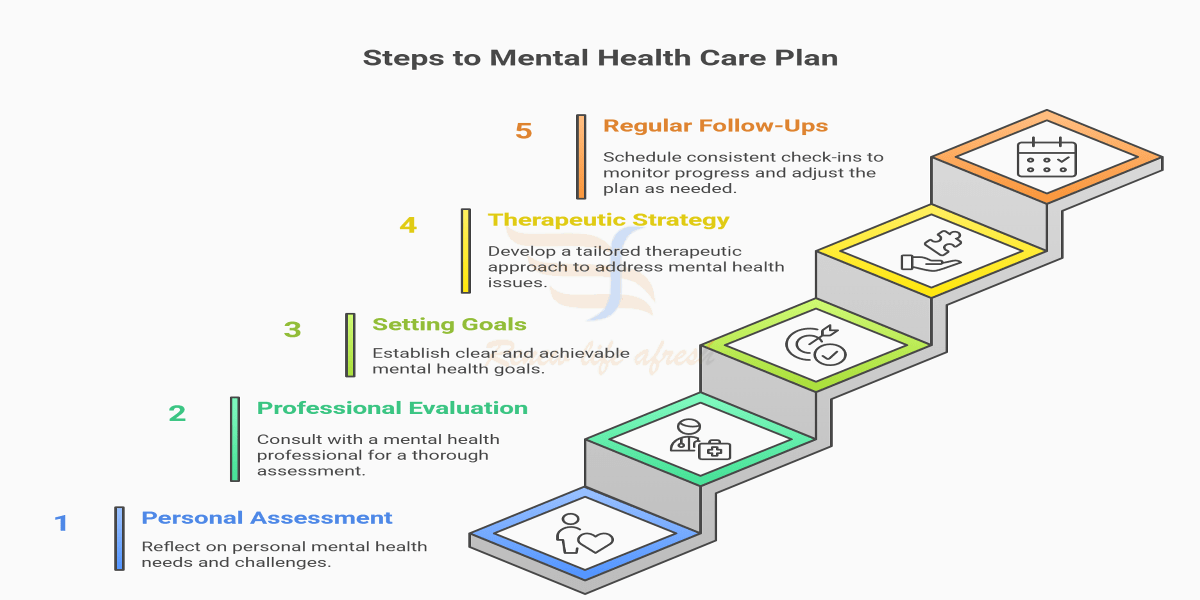How to Take Care of Mental Health: A Complete Guide from Eskag Sanjeevani Hospitals
According to the Centres for Disease Control (CDC), mental health includes our emotional, psychological, and social well-being. It affects how we think, feel, and act 1. Poor mental health is the primary cause of lack of focus, enhanced fatigue, and strained relationships, which lead to disturbance of daily life. It is important to prioritise elevated stress and mood changes to avoid any chances of emotional decline.
In this blog, we will understand how to take care of mental health through practical steps that can support long-term balance and emotional stability.

Importance of Mental Wellness and Self-Care
A recent survey from the National Mental Health Survey (NMHS) in India suggests that 10.6% of adults in India suffer from mental disorders 2. Self-care has a vital role in maintaining good mental health, and understanding how to take care of mental health ensures both physical and emotional well-being.
Here are some of the importance of mental wellness and self-care
- Emotional Balance: Both mental and physical health are closely related, and maintaining emotional balance enhances focus and decision-making capabilities in personal and professional life.
- Avoiding Mental Disorders: Mental disorders have a major effect on an individual’s health behaviours, such as eating habits, regular exercise, and adequate sleep. Data suggests that the lifetime prevalence of mental disorders in India is 13.7% 3. Maintaining a healthy relationship with friends and community groups can reduce the chance of mental disorders.
- Improvement in social life: Poor mental health has a negative impact on holistic wellness and leads to social problems such as unemployment, drug abuse, and related crimes. Mental wellness and self-care help you recognise warning signs such as sudden mood shifts and withdrawal from activities.
- Safe Recovery: In most parts of the globe, the treatment of mental illness was alienated from traditional medicine until recently. However, the Mental Health Care Act 2017 guarantees that everyone has the right to access mental health care 4. Such initiatives help in early recognition to reduce distress and amplify the effect of self-care strategies.Note: Experts believe that if only one person in a family suffers from mental health issues, it can impact the entire family, and mental health challenges can lead to dangerous fights and separation.
Also read: World Mental Health Day: A Call to Prioritise Mental Wellness at Eskag Sanjeevani Hospitals
Now, let’s understand how to take care of mental health to maintain healthy relationships and stability at home and the workplace.
How to Take Care of Mental Health: Daily Habits?
An appropriate mental health helps you carefully manage stress and make informed choices. The World Health Organisation (WHO) estimates that mental health issues in India are 2443 disability-adjusted life years (DALYs) per 10000 population 5.
Here’s how to take care of your mental health with subtle lifestyle adjustments and daily habits.- Maintain Adequate sleep: Maintaining a healthy sleep cycle is a difficult process, while adults require a minimum of seven to nine hours of sleep a night. If you are struggling with your sleep, develop a relaxing bedtime routine before going to sleep. Moreover, avoid mobile screens, TVs, vigorous exercises and caffeine before going to bed.
- Regular exercise: Maintaining regular exercise or participating in activities such as dancing, cycling, or walking can improve mental and physical health. The neurological benefits of exercise include lower levels of cortisol, which is the stress hormone and reduced levels of anger and stress among individuals. Additionally, being a part of a team is also a great way to improve mental wellness.
- Maintain a Healthy Diet: A balanced diet with fruits and vegetables has a positive impact on physical and mental health. Developing eating habits in a collaborative environment can help grow relationships between friends and colleagues, which is a critical factor in preventing problems.
- Open-Mindness to New Experiences: Most individuals get stuck in familiar ways, and responses may seem familiar, which may lead to a monotonous routine. Making simple changes in your daily lifestyle, like taking an adventure holiday, can make a difference and improve your mental state.
- Open Communication for Trust and Support: Talking to someone you can trust or in a community can make you feel safe and less isolated, and help you protect your mental health.
- Avoid Drug and Alcohol Use: Drugs and alcohol may provide a temporary relief from mental distress, but have severe implications in the long run. Complete avoidance is a critical element of your mental health care plan and self-care routine to reduce the chances of anxiety. A possible next step is to consult with a counsellor to avoid the use of drugs and alcohol.
Next, let’s understand how you can create a mental health care plan for a sustainable mental state.
Stepwise Guide to Develop a Mental Health Care Plan
A systematic plan is helpful if you want to isolate what affects your emotions, methods of responses and ways of communication. Learning a structured way on how to take care of mental health makes the recovery process predictable and reduces the chances of relapses.
The following step-by-step guide can help you develop a mental healthcare plan with ease:Step 1: Personal Assessment
Record each of your mood, sleep and thoughts for at least two weeks. With the help of a daily chart, you can identify recurring triggers such as diet, work pressure, or lack of rest. Clear documentation helps you and your clinician understand the pattern of your mental state before treatment strategies.
Step 2: Professional Evaluation:
The next step is to visit a qualified psychiatrist for a formal assessment. Healthcare practitioners may use specific diagnostic tools such as the Generalised Anxiety Disorder (GAD-7) and Patient Health Questionnaire (PHQ-9) to understand the nature and severity of clinical baselines for future care.
Step 3: Setting Goal
It is important to define measurable goals under supervision in this stage, and some of the examples include maintaining normal sleep and returning to regular work hours. Such milestones provide motivation and help you to accept challenges and achieve them.
Step 4: Therapeutic Strategy
Psychiatrists can formulate an integrated plan which may include medication, cognitive or behavioural therapy. Medical strategy at this stage, at a regular interval, is necessary to monitor the responses to treatment and side effects for a sustainable therapy.
Step 5: Regular Follow-Ups
The final step is to schedule routine reviews even with stable symptoms. Keep emergency numbers such as Tele Manas 14416, which is a 24/7 tele-counselling service across India. Maintaining continuous supervision can promote long-term mental wellness.
To maintain a steady state of mind, it is important to adopt strategies and tips to maintain your mental health.

3 Tips to Enhance Your Mental Health
Our emotional, psychological, and social well-being constituent to mental health. Continuous care and support ensure that there are positive changes during treatments.
You can use the following tips to enhance your mental health:
- Developing Connections: You can start developing a healthy relationship which can support you from the negative effects of stress. It is also critical to build relationships with communities and neighbourhoods, for example, volunteer for a local organisation or join a group.
- Practice Gratitude: Gratitude practising allows you to become appreciative of positive things, which translates to pleasant, holistic experiences. A sense of gratitude can help you recognise positive emotions and make you less stressed.
Positive Attitude: A positive attitude implies a strong state of mind that can go through adverse emotions such as sadness or anger. A positive attitude also clears brain fog, which allows for a sharper focus, along with steady emotions and improved ability to understand valuable thoughts.
Now, let’s explore how you can develop a long-term recovery plan for mental health treatment to enhance mental wellness.
Long-Term Recovery to Improve Mental Wellness
Long-term recovery demands awareness, consistency and scientific care. When you know how to take care of mental health, you learn to manage anxiety, tension, and depression with appropriate clinical insights.
Here’s how you can develop a long-term recovery plan to enhance mental health:
- Control of Depression: To understand how to take care of mental health while managing depression, it is important to initiate with regular medical supervision and structured daily tasks. Exposure to a balanced diet and social interaction restores positivity and enhances cognitive discipline to reduce the chances of depressive events.
- Anxiety Management: Anxiety results in a rapid heartbeat and restlessness, which often can be managed using rational response therapy. The process reinforces the awareness of how to take care of mental health through direct management. Moreover, it is important to avoid stimulants such as excessive consumption of caffeine, which may increase anxiety levels.
- Control of Overthinking: Overthinking leads to a deficiency in attention and increased fatigue. A psychiatrist may deploy cognitive defusion exercises to train detachment from intrusive thoughts. Learning how to take care of mental health at this stage helps set the stage for though duration and redirects towards practical steps.
- Continuous Evaluation: Recovery is a critical factor for a healthy mental state, and a sustained evaluation strengthens the overall process. When you seek professional advice, it improves your support for wellness and develops customised treatment plans for long-term recovery.Eskag Sanjeevani are among the best hospitals in Kolkata, which specialises in psychiatric and psychological services to address emotional distress with medical nuance. In addition, the trauma care at Eskag Sanjeevani Hospitals provides immediate mental health evaluation along with crisis management and rehabilitation for complete recovery.
Final Thoughts
A systematic approach to how to take care of mental health develops lasting emotional stability and clarity. True mental wellness is dependent on disciplined habits, regular professional consultation and self-assessment. In addition, maintaining daily habits such as regular exercise, quality sleep can act as a foundation for emotional balance.
With regular implementation, you can protect your mental strengths and ensure steady progress towards a healthy lifestyle. Long-term recovery often depends on clinical guidance from the best psychiatrist in Kolkata, who can assess sage progress and sustained mental wellness. Schedule a consultation today for expert guidance from our doctors.
You can enhance your mental health with a clear focus on physical well-being through a healthy diet and adequate sleep. Moreover, you can prioritise self-care by setting realistic goals and establishing strong connections for long-term mental well-being.
5 ways in which you can help maintain your mental health include,
Establish a good relationship with other people, which is important for your mental well-being.
Develop novel skills and keep yourself engaged.
Prioritise events which are happening at present and avoid overthinking and procrastination.
Engage in physical activities such as walking, exercising, and other fitness activities.
Maintain open communication with your peers and friends.
You must start by acknowledging and maintaining open communication with the person to discuss the importance of mental health. You mustn’t diagnose their feelings and make sure they are open about their mental condition. Prioritise questionnaires which are open-ended and discuss self-help.
There is no prevention from mental illnesses; however, you can lower the chances of mental illness by adopting a healthy lifestyle. It includes maintaining a healthy diet, regular exercise and adequate sleep. Developing a strong social connection and managing stress by limiting the use of drugs and alcohol can help you maintain a healthy mental state.
The primary step for healing mentally involves acknowledging the challenges which need attention. It is often considered a difficult stage; however, it requires confrontation with reality and includes acknowledging to diagnosis and recognising the impact of mental health.

